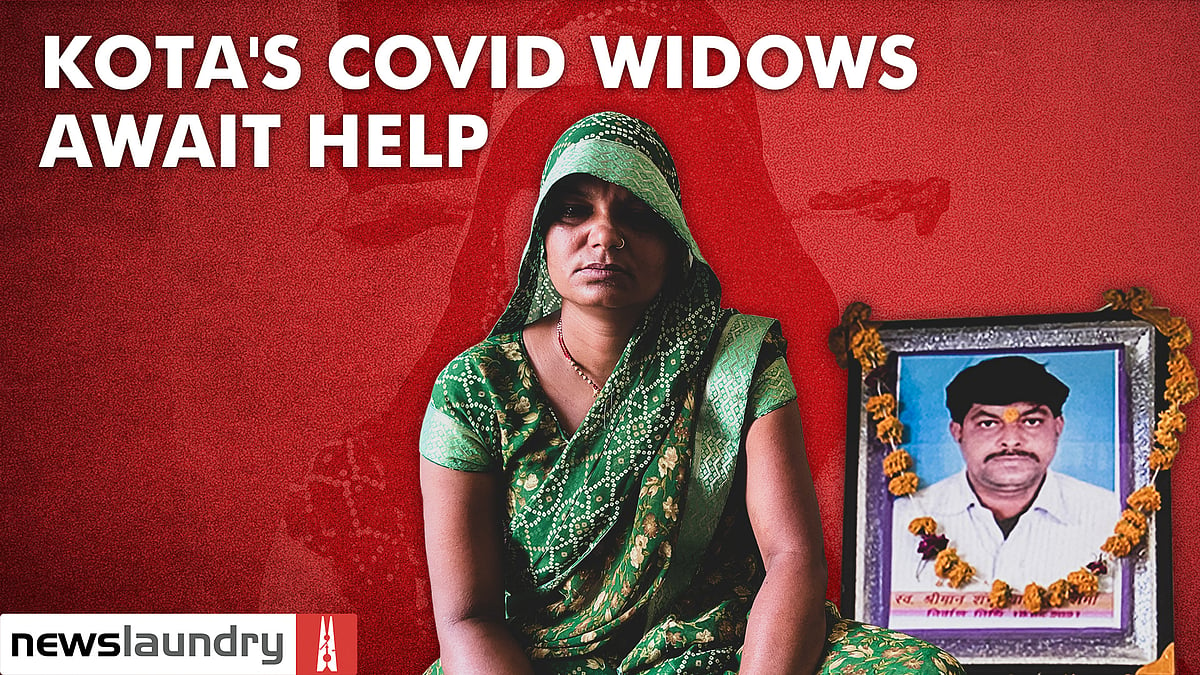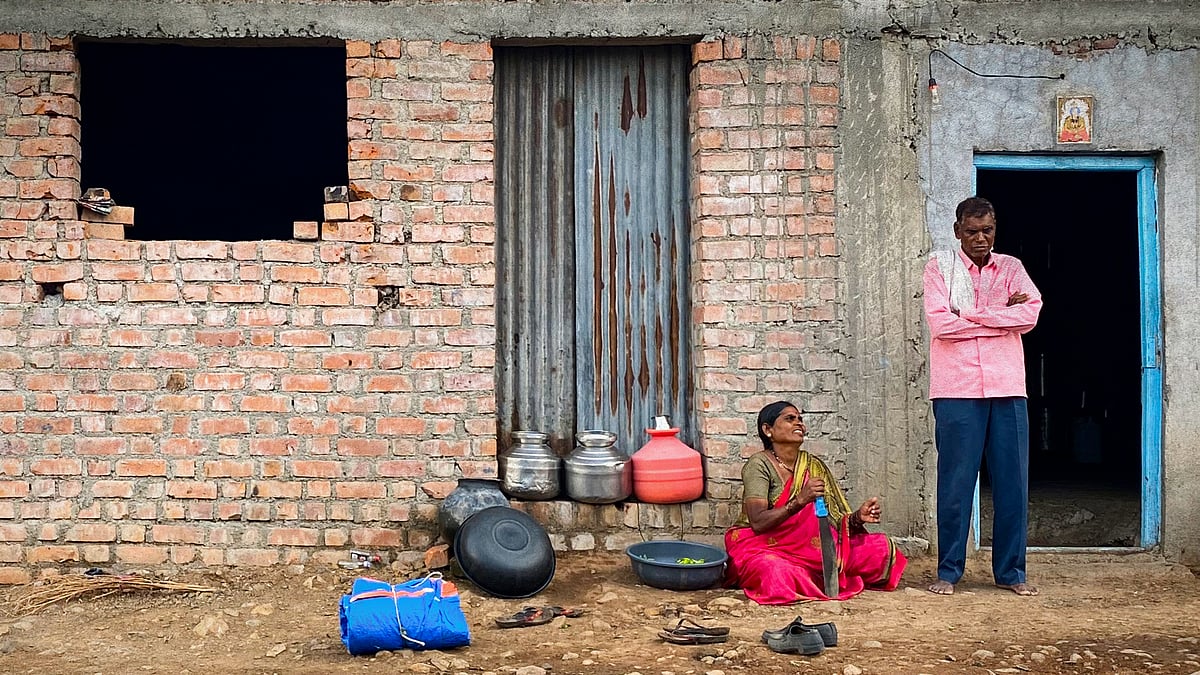‘We live hand to mouth’: Maharashtra’s Covid widows are desperate for government assistance
In many cases, their husbands were the sole breadwinners, leaving behind families that can barely manage two meals a day.
Anita Jadhav, 30, is unable to stop checking her phone. She constantly picks it up, hoping to find a message from a potential customer.
Ever since Anita’s husband, Sudam, died of Covid last year, she’s been struggling to make ends meet. She now sells saris and cakes from her home in Pune’s Kalewadi, earning a profit of around Rs 400-500 a week to take care of herself and her two young daughters.
But Anita is just one of nearly 20,000 Covid widows in Maharashtra, barely managing two square meals a day and receiving no aid from the state government.
Sudam died on July 29 last year. An auto rickshaw driver, he contracted Covid on July 18 and was hospitalised before passing away. He left behind his wife, two daughters, and multiple loans: Rs 36,000 was borrowed for his treatment and Rs 2 lakh for the purchase of his rickshaw, of which only Rs 1 lakh was paid off. Anita was forced to sell the rickshaw for Rs 30,000.
“After the death of my husband, I started selling cakes and saris to support the family but I hardly manage to earn a profit of even Rs 400 in a week,” Anita said. “I have two small daughters and have to take care of their education as well.”
She added, “For almost two months after my husband’s death, I was in depression. My parents took care of my children then. But then I realised I have to take care of my daughters. My daughters are not able to attend online classes as I don’t have an Android phone. I am not even able to pay their school fees. We are living in a difficult situation. The government should do something for women like me. They can at least give us some job.”
Desperate, Anita now plans to try her hand at being an auto rickshaw driver. “I can ride a two-wheeler and will learn to ride a three-wheeler,” she said. “It costs Rs 40,000 to get a permit to drive an auto rickshaw...I have started the procedure and hopefully will get it in a few months. That’s my only hope.”
But this is just one of numerous stories that Newslaundry heard across the state: of women left bereft by the loss of their husbands, who were often the sole breadwinners, and a state government that gave them no solace.
For the want of a job
In Ahmednagar’s Akole, Kanchan Shinde, 27, lost her husband Sunil to Covid last September. Sunil was the sole earning member of their family of four – the couple had two daughters aged seven and eight – and Kanchan is struggling to pick up the pieces.
“We live really hand to mouth,” she told Newslaundry. “We live in a one-room house with a tin roof which is leaking, and I don’t have the money to repair it. The day my husband died, I didn’t even have Rs 10 with me. We didn’t have any food at home. My neighbours gave us food for two days and then we had to quarantine at a Covid centre in Khanapur.”
After their quarantine, Kanchan and her daughters moved in with her parents for a couple of weeks before returning home. Kanchan then began work at a peanut mill, earning Rs 80-100 a day. It was temporary work and the money was scarcely enough to feed themselves.
“I don’t have any work now,” she said. “Even when I get work, it’s only for two or three days. Sometimes I have to make them [her daughters] sleep on an empty stomach. When my husband was there, he used to earn Rs 300-400 everyday and we were able to manage...Getting any kind of vegetable has become so rare for us that they have become a delicacy. I am able to feed them dal because it’s provided by the school.”
Like Anita, Kanchan took a loan of Rs 32,000 for her husband’s treatment. She’s been unable to make any progress in paying it back. “I beg the government to just give me a job so that I can raise my children and educate them,” she said.
In Kasaari village in Gadchiroli, Rohini Meshram, 45, has a similar story. Her husband Roshan, who was employed with the gram panchayat, died of Covid in April. Without his monthly salary of Rs 8,000, Rohini is struggling to care for herself and her daughter. She’s now leased their one acre of land for two years for Rs 9,000.


“I run a tea stall, getting business of around Rs 100 a day of which profit is hardly Rs 30-40,” Rohini said. “My daughter is mentally challenged and I need to take care of her as well. I need money for her medicines. If something happens to me, I don’t know who will take care of her. We do have grains as I did farming last year but we need money to buy basic necessities.”
In Nandgaon tehsil in Nashik, Sheetal More, 27, lives with her nine-year-old son Yashodeep and six-year-old daughter Mansi, who is a cancer patient. Sheetal’s husband Jitendra was a barber. He died of Covid in May, as did Sheetal’s father.
“I presently live at my parents’ home in Chalisgaon,” Sheetal said. “In a week, I’ll return to my home. My daughter has cancer and it costs around Rs 5,000 every month for her treatment. I don’t know what I will do. I really need a job at an anganwadi or elsewhere; I need money to bring up my children. Please do help us. The government should provide us with some jobs.”
‘It’s a sad state’
According to Heramb Kulkarni, a writer, social activist, and convener of the Covid Ekal Mahila Punarvasan Manch, an organisation that works with Covid widows, Maharashtra has around 20,000 women who lost their husbands to Covid. Their husbands were all aged 50 or under when they died.
“We found this figure on the basis of a Lancet report and government data,” Kulkarni said. “The Maharashtra government really needs to pull up its socks and help these women. They should give them a one-time package of Rs 5 lakh. They are burdened with hospital loans and don’t have jobs. They should increase the pension of widows; it’s only Rs 1,000 under the Sanjay Gandhi Niradhar Yojana. Give them zero percent interest for loans and jobs.”
He added, “These women don’t want to be dependent on anyone. They want to work to sustain their families. We are also receiving reports that such widows have been shown out of their houses by their inlaws as they do not have property in their names. The government should take cognizance of that.”
Kulkarni said his organisation has been trying to convince the state women and child development ministry to help the widows, but without success. “Instead of the government, hundreds of NGOs are coming forward to help these women,” he said. “It’s a sad state.”
Nitin Pawar, the founder of the Swadhar Mahila Panchayat, told Newslaundry he submitted a memorandum on the issue to Yashmoti Thakur, Maharashtra’s women and child development minister.
“Covid widows are living in dire conditions. But the state government is not taking it seriously,” he said. “There are states like Odisha, Rajasthan and Delhi who have come forward to help such women. The centre needs to focus on this and design a policy for such women across the country.”
Newslaundry contacted Yashmoti Thakur to ask her about aid to Covid widows but did not receive a response.
 Rajasthan: Kota's Covid widows are victims of state neglect
Rajasthan: Kota's Covid widows are victims of state neglect Covid has pushed seasonal sugarcane cutters in Maharashtra’s Beed to the brink of poverty
Covid has pushed seasonal sugarcane cutters in Maharashtra’s Beed to the brink of poverty